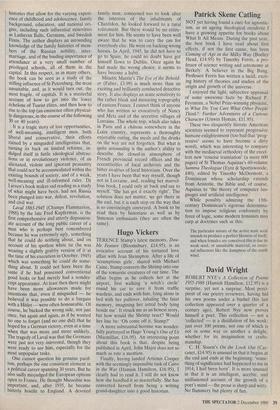Richard Cobb
I ENORMOUSLY enjoyed Dominic Lieven's Russia's Rulers under the Old Regime (Yale, £27.50). The book repre- sents a highly successful combination of massive statistical tables and an imagina- tive use of a series of personal case
histories that allow for the varying experi- ence of childhood and adolescence, family background, education, and national ori- gins, including such influential minorities as Lutheran Baits, Germans, and Swedish Finns. The author displays an astounding knowledge of the family histories of mem- bers of the Russian nobility, inter- marriage, and of the binding importance of attendance at a very small number of privileged schools, all of them in the capital. In this respect, as in many others, the book can be seen as a study of the stifling influence of St Petersburg, the most unsuitable, and, as it would turn out, the most fragile, of capitals. It is a masterful account of how to get into the lower echelons of Tsarist elites, and then how to rise to the top (an eminence often physical- ly dangerous, in the course of the following 30 or 40 years).
It is a tragic story of lost opportunities, of well-meaning, intelligent men, both liberal and conservative, their efforts ruined by a misguided intelligentsia that, turning its back on limited reforms, in- dulged itself in futile ideological abstrac- tions or in revolutionary violence, of an alienated, violent and ignorant peasantry that could not be accommodated within the existing bounds of society, and of a weak, well-meaning and ill-informed ruler. Dr Lieven's book makes sad reading as a study of what might have been, had not Russia been plunged into war, defeat, revolution, and civil war.
Laval 1883-1945 (Champs Flammarion, 1988) by the late Fred Kupferman, is the first comprehensive and utterly dispassion- ate account of the long public career of a man who is perhaps best remembered because he was extremely ugly, something that he could do nothing about, and on account of his spotless white tie (he was wearing a slightly grubby version of it at the time of his execution in October, 1945) which was something he could do some- thing about. It could not have been the same if he had possessed conventional good looks or had merely had a nondes- cript appearance. At least then there might have been more allowances made for Intentions that, even if misguided — he believed it was possible to do a bargain with a Hitler were often honourable. Of course, he backed the wrong side, not just once, but again and again, as if he wanted no one to forget (and no one did) that he hoped for a German victory, even at a time when that was more and more unlikely. The tragedy of Laval was that the Germans were just not very interested, though they were ready to use him, especially for the most unpopular tasks.
One cannot question his genuine pacif- ism, perhaps the one consistent element in a political career spanning 30 years. But he also sadly misjudged the European options open to France. He thought Mussolini was important, and, after 1935, he became bitterly hostile to England. A devoted family man, concerned too to look after the interests of the inhabitants of Chateldon, he looked forward to a rural retirement. But there would be no retire- ment for him. He seems to have been well aware that he was to carry the can for everybody else. He went on backing wrong horses. In April, 1945, he did not have to go to Spain, he could no doubt have got himself flown to Dublin. Once again he had made the wrong choice; it seems to have become a habit.
Minette Marrin's The Eye of the Behold- er (Faber, £3.99) is much more than an exciting and brilliantly conducted detective story. It also displays an acute sensitivity to the rather bleak and menacing topography of eastern France, I cannot think of anyone who has written so evocatively of Nancy and Metz and of the secretive villages of Lorraine. The whole trip, which also takes in Paris and a château somewhere in the Loire country, represents a thoroughly enjoyable outing, the meals and the drinks on the way are not forgotten. But what is quite astounding is the author's ability to describe the closed-in atmosphere of French provincial record offices and the eccentricities of local archivists and the bitter rivalries of local historians. Over the years I have been that way myself, though not in Lorraine, and, reading her marvel- lous book, I could only sit back and say to myself, 'She has got it exactly right'. The solution does not matter, we get there in the end, but it is each stop on the way that is so convincingly conveyed. A book to be read then by historians as well as by Simenon enthusiasts (they are often the same).











































































 Previous page
Previous page